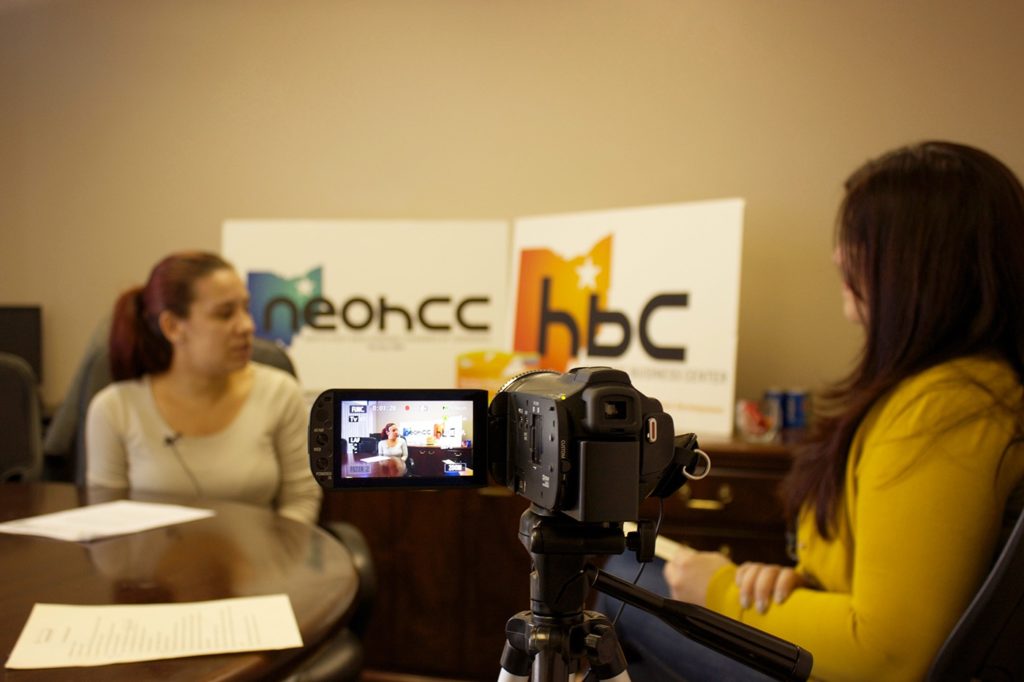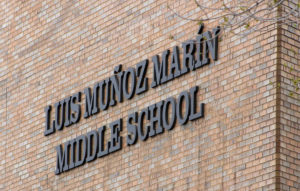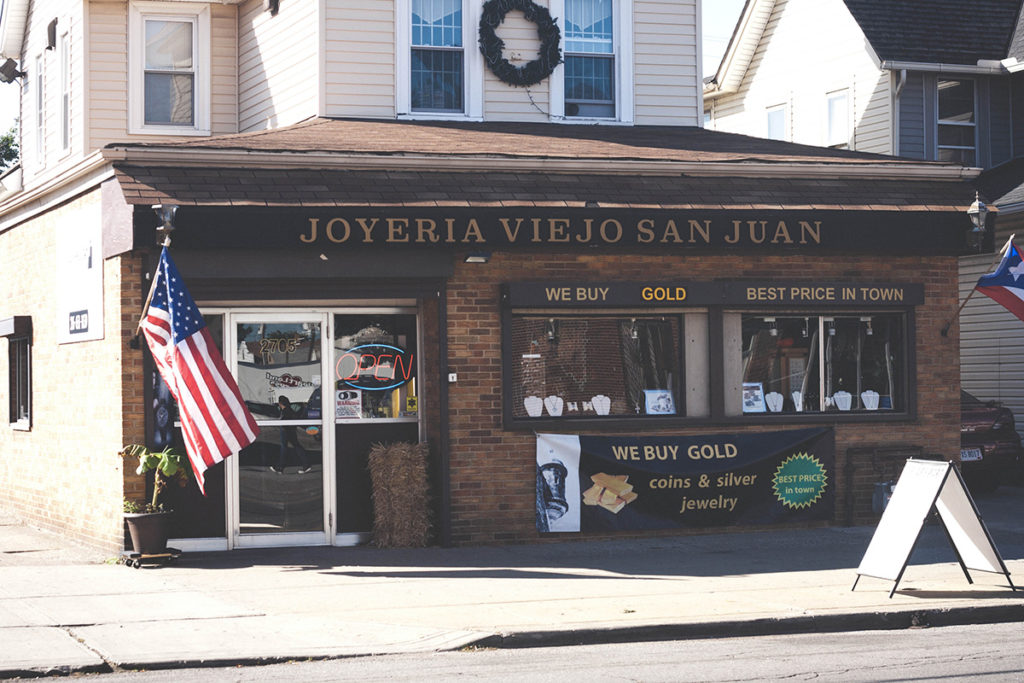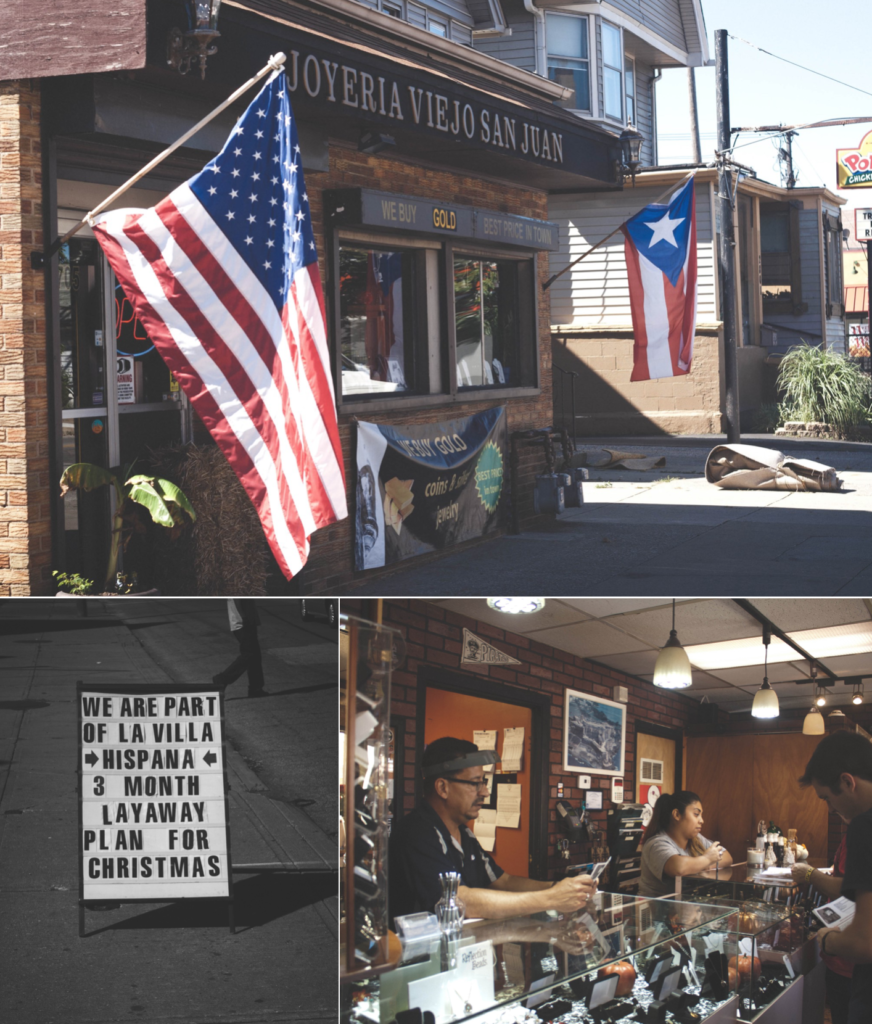3. Los Profesionales
Alexandra Pagán

AP: Alexandra Pagán.
EF: Where were you born? And where did you grow up?
AP: I was born in Atlantic City, NJ, and moved here when I was 3 to Cleveland, OH. I’ve been on the same street, not living, but working. My parents worked on the street for over 20 years now and I’m a Cleveland gal.
EF: I know you were very young when you moved to Ohio but can you tell what it was like growing up here in those first years of coming here? And maybe if you could mention, in particular, growing up as a Latina?
AP: So, especially, this area of Cleveland is very diverse, but mostly Latinos. You see a lot of Latinos here. So, I can say I wasn’t in Puerto Rico but I still grew up around my people. It’s a home because there are so many … you become so tight in the community. People know you. You’ve been here so many years that customers tend to become like family and you can, especially Latinos, we have no problems speaking to each other problem-wise and everything.
Alexandra Pagán Youtube Interview
Alexandra was interviewed in Cleveland, OH.
EF: Can you tell me a little bit about the experiences in school for example?
AP: Well, I starting out I went to private school. Lutheran was the religion. Then growing up, we went to public school in this community. It was Luis Muñoz Marín middle school then you have Linden West High School. I attended Rhodes High School, but again, this area is diverse that I had Latinos, Americanos, African- Americans, Chinese, and again, a lot of Latinos
EF: You speak Spanish.
AP: Yes.
EF: How did you and your family make sure that you maintained the language? Was it only at home? Or was it also in school?
AP: Well, when I was younger, I only knew Spanish until I got into school. Once I started school is when I tried to mostly learn English to communicate with the kids at school. It was in kindergarten and 1st grade when you kind of forget your language a little bit, but me being … working with Latinos in the community, I’ve been able to keep my language but it’s still a little hard with certain words. In English, it’s a little bit easier for me still, because …I don’t want to say it’s my 1st language, but they are both neck and neck because we use them equally. At home, we only speak Spanish with the parents, especially with older family members. My son gets taken care of by my sister’s godmother and my son knows both languages- his numbers and his letters in both English and Spanish, and he’s only 2. Being exposed to both languages is a great benefit.

EF: Your background is Puerto Rican. What traditions, songs, stories have been part of your family as a Puerto Rican growing up?
AP: My dad is a very traditional Puerto Rican father. He loves parrandas. He loves when the Puerto Rican parade comes. He likes rumbones. I grew up with a dance group called Cultura Unida, which was a church-based group but we tried to focus on all traditions of different [groups]. I had Mexicans, salvadoreños, hondureños. So we did typical dance from all the countries. So, it’s something that I’m very familiar with. My sweet 15 was actually folclórico so, yes, it was very root based. But every year, we never fail around Christmastime, we have even if it’s just our family, my mom will bring out the instruments and we play entre familia como uno dice. Puerto Rican parade comes and we are right next door, my dad will host a rumbón and all his friends will come with the congas and everything and play. So, music wise, we are very aware of my roots.
EF: You mentioned sweet 15. So you did a quinceañera? Tell me a little bit about that.
AP: Quinceañeras are very big in our culture. We don’t celebrate the sweet 16. It’s basically the same thing as the sweet 16 to where a young girl is introduced to womanhood in a sense. Mine was literally full of dresses made for bomba and plenas. The guys wore guayabera and the gorritos. We danced punta. I’m sorry, punta es hondureño. We danced bombo and plena; salsa and we did a little bit of merengue. It definitely was very traditional.
EF: What are some of the traditions in the quinceañera? Different countries have different traditions. Obviously, yours were very Puerto Rican in a musical sense. Is there anything else that happens in a quinceañera?
AP: They do the changing of the shoes, where the girl wears flippers and then you change into heels. The passing of your crown, so you pass your crown down to the next young lady in your family that will turn 15. Those are 2. We did a rose ceremony to where everyone that participated in the sweet 15 handed me a rose. At the end, I gave it to a person of honor to me, which was my mother. And we also do the candlelight ceremony to where special people that have guided you through your 15 years of life light a candle in honor of the night. So, it’s very memorable.
EF: Great. Do you have sisters that have also done this?
AP: Yes, I do have a younger sister.
EF: And did she choose a different theme?
AP: Yes, hers was actually “Phantom of the Opera.” That was her thing back when she was 15. But again, it’s so much work. It’s all for one night but it’s so fun. Again, she did the crown and she did the shoes. She’s a non-traditional, so hers was way different than mine but it was a good time.
EF: Thinking about those celebrations, like quinceañeras or other celebrations that are Puerto Rican. In what ways has it been a point of experience for other people? For example, not just Puerto Ricans but Anglos or African Americans.
AP: Well, I’m now comprometida and my fiancée es moreno. So, when we first had our son, we didn’t know if we were having a boy or girl. The first thing I remember him telling me, if we have a daughter we’re not spending all that money on a sweet fifteen. I said that it’s tradition. Another thing that is tradition for us is baptism. You get the child baptized within the first few months or at his first birthday. That’s another problem we have. He’s Baptist and they baptize when they’re older. So, with having a mixed culture, there’s a lot of things that are done differently. At my sweet 15 I didn’t have too many friends because it was mostly my parents and friends. We kept it very traditional. But the few friends that I did have there were like “What is this? It’s like a wedding!”
EF: What are some of your first memories of being in this state?
AP: Most of my childhood did take place on this street. My parents, both were hard working parent, they worked all day, 6 days a week, we got off Sunday and that was for church. With them working the long hours, I would go to school and come to their job for the rest of the day. It was me and two others where my parents worked with their parents. My mom is a hair stylist so it was all day at the beauty salon. We were raised there so, we called this home because, yes we have another place we called home, this is basically it. We had our fun there, we had our own little room in the beauty shop.

EF: You mentioned that your parents had 2 businesses. Have you had other jobs or did you mostly work for them?
AP: I did have a few other jobs that I did in the food industry and all that. But my dad instilled in me, since we were very young that no one will treat your stuff like the owner, like you. It’s something that both my parents have worked so hard own something that they want to pass down to their children. Unfortunately, the beauty shop wasn’t for me but the jewelry industry was. When I was nineteen [my dad] left the business for one full year. He kind of gave up on me for a bit and I have to take charge, the shop was mine for a whole year. He’d call every once in a while to check and make sure everything was okay. But now, thank God he’s back with me again. No one treats your business like you will. Your customers, as long as you treat them like family, they come back and they like the feel of family based business.
EF: When did he start this joyería?
AP: It’s a funny story. When my mom worked at the beauty salon, he had one showcase in that barbershop and one repair room which he still worked at the factory at that time, but when he got out he went there. And he did that for about 6 years in about 1994-95. In 2001, we opened our first joyería Viejo San Juan and we’ve been blessed, we’ve been there for 13 years. My father had the chance to open one in Puerto Rico and it got a little hard managing two, so we downsized to one again.
EF: Where did this interest in the joyería come from?
AP: It was actually passed down. My grandmother, his mom, had a jewelry shop in Puerto Rico, which is the one that he had repurchased a few years ago. Hers was in front of a middle school and she sold jewelry and did school supplies, so it was a mix of everything in her store. She passed down her contacts to her son. That became his passion, he went to school, got his degree for repair jewelry, diamonds and all that.
EF: Are you knowledgeable?
AP: I do repairs. I didn’t go to school yet, it’s in the future plans. But through watching him over the years, I’ve learned a lot. I say he is my teacher.
EF: You mentioned you have a son. How do you think that your culture affects your son growing up? How will you instill those values in him?
AP: Me and my father talk about this a lot because I feel that, we passing generations, a lot of our traditions have died down. Now, you have a lot of Latinos would be like, “that’s jíbaro; we’re not in that time no more.” “We’re modern.” But you need a sense of holding on to those traditions because if we don’t keep them, our kids won’t get to see them. So, when it comes to Christmastime, my fiancée doesn’t want to partake in it because that’s not his thing. But, as far as my son, I try to involve him in everything and let him experience the music and I make sure he likes to dance salsa. As far as the language, that is very important to me because [being] bilingual is the best, yes more than one language is amazing.
EF: Who is the most important person in your life?
AP: Wow, it’s kind of a tug of war between my dad and my mom because they are my backbone but I’d have to go with my mom. Sometimes, it’s harder to open up to her than it is to my father because he is more calm. A Latina woman is a little bit more aggressive but she definitely has has my back no matter what … She’s always supportive and I can’t say she has ever turned her back on me. I see that a lot in some cultures that once the kids turns 18, los Americanos are a little bit different, they say “okay, it’s your turn now, bye!” and as far as me, yes I moved out at 18. Now I have my family but I every evening I end up at my mother’s and say, “Hey mom! What are you doing?” That’s home.

EF: What have been some of the happiest times of your life and some of the most difficult times of living in this area?
AP: I love Christmastime here, but I also love summer here. But a lot of people, I want to say, down-talk on Cleveland and say that it’s a boring city and that there’s nothing to do. But, honestly, if you step outside the box, there’s a lot to do. Yes, a lot of it involves having some money and going out and spending it, but there is so much to do here. I would have to say happiest time, and just because it is [around] culture would have to be summer when we have our parade. My dad is what brings the joy out. He is like “un rumbón, vamos a hacerlo aquí” so that really brings the sense of happiness. And Christmastime, I just love Christmas music, Spanish or English. The saddest, unfortunately with the crime and everything, when you hear stuff like the girls that were taken or deaths, people getting killed when they have kids at home, or you go out to have a good time and your life gets cut short because someone is being ruthless. Definitely, that is something that needs to get taken care of, because it’s very unfortunate.
EF: What are some of the stories from your parents that you like to hear the most?
AP: So, I know my mom always tells, like, we’re not girlie girls I don’t want to say a tomboy either, but we are rough when we have to be. Let’s say there is some heavy furniture that needs to be moved, we don’t wait for the men to do ti. I say, “come on mom, let’s do this” So that’s one thing she always says, “oh, eso lo sacaste de tu madre.” She is so, independent, we got that from her, wait till you meet her. She always talks about how she used to climb the trees in Puerto Rico, and skateboard, basketball, and baseball. She was really good at baseball. My mom is very hard working, and when my parents met, my grandma owned the jewelry store, my mom was her employee and that’s where the love kindled.
EF: You said a lot of your clients are Latinos, and I assume recent and long time immigrants, would you say?
AP: In this area, most of the time it’s long time immigrants, you do occasionally get new ones, just because of the name on the building, they’ll stop in, “Ay, por fin consigo un Puertorriqueño” Tell me, “Where do I get food?” tell me, “Where do I go shopping?” so we do get that a lot. And that’s one of the good things about this area, I can direct you towards food, I can direct you towards botánicas, whatever you are looking for.
EF: What advice would you give to immigrants or Latinos in this area? What do you think is important for them to do or to know?
AP: Just because in recently years, I’ve had two employees that are from Mexico and it’s brought about more awareness to me of their struggles. Puerto Ricans are blessed to be part of the U.S. where we don’t have that immigration problem. It’s sad to say, but they are scared of the law, they are scared of adventuring because they might get caught or a family member, or whatever the cause may be, look for a better future, if you came here there is so much. Just in Ohio, there is help … don’t let that barrier stop you, it’s possible. If it’s for you or for the kids, whatever your goal is, go for it. You can get an education, you can learn the language, it’s never too late. And there is so much room for progress.
EF: What does Ohio mean to you?
AP: Ohio is home. I can travel and after a week or two, “take me home.” I love my island of Puerto Rico, it is amazing, but after day 12, I am like “take me home.” This is my home, definitely.
EF: What message would you like to give to your kids, grandkids, great-grandkids, so you in the future, what would you like them to know?
AP: First let’s say, don’t take your mother for granted. I’d say get your education, reach for the stars, it sounds cliché, don’t ever stop, the sky is the limit. Seeing [it] from my sister, I am so proud. She is a CSU student now, and it’s amazing, she is like my kid.
EF: Is there anything else you would like to tell us in this interview that I haven’t asked?
AP: I would say that we Latinos are in Cleveland are very orgullosos, and we relate to one another. So, I’ve seen cuando hay una bandera, “Oh, we’re both Puerto Ricans. We’re in the same spot.” We definitely stick together. Latinos stick together whether it’s Puerto Rican, Mexican or not. When we are in a situation or when we are in a place and we only see another, we’ve always got each other’s backs. We are proud, we are a great community and I believe we have the power.
